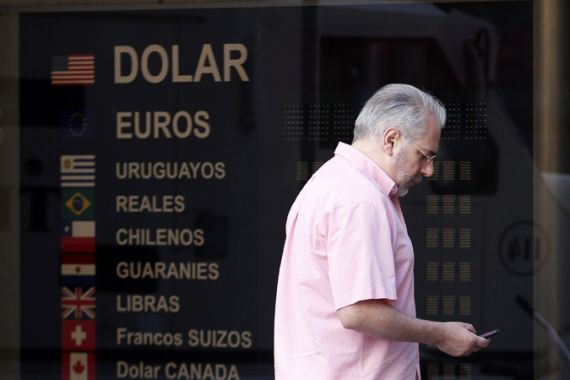Argentina toughens rules on dollar trades
Argentina imposes tough new regulations on exchanging pesos for dollars in bid to curb tax evasion and money laundering.

 |
| Some currency exchange houses in Buenos Aires were empty on Monday, as demand for dollars fell [Reuters] |
Argentina has imposed new restrictions on the purchase of US dollars in an attempt to crackdown on capital flight, tax evasion and money laundering.
Those seeking to buy dollars in the South American country will now be required to explain where they get their money from, and show that they have paid their taxes before they can exchange Argentine pesos.
Keep reading
list of 4 itemsEcuador weighs security, international arbitration in latest referendum
‘Triple spending’: Zimbabweans bear cost of changing to new ZiG currency
Boeing hit with 32 whistleblower claims, as dead worker’s case reviewed
In a country prone to periodic bouts of hyperinflation and where inflation currently runs at 10 per cent, many Argentines buy US dollars to protect their wealth.
They will now have to present their national identity and tax number, which must then be approved by the national tax agency (AFIP) before the transaction can go ahead.
Some exchange houses remained closed on Monday as a result.
The new currency controls were introduced a week after President Cristina Fernandez de Kirchner was re-elected by a huge margin.
One of her election pledges was to bring inflation under control and regulate currency flows.
Capital worth billions of dollars has been flowing out of the country as wealthy Argentines seek to protect their money from inflation and a possible devaluation of the peso.
To deal with the loss of the value of the peso, the government has been forced to sell some of their dollar reserves on the currency market, although with current reserves of more than $47 billion the country has recovered significantly from its world-record default and currency devaluation in 2001-02.
That led the government to freeze people’s bank accounts and default on its foreign debts and left Argentina with just $11bn in foreign reserves when Kirchner’s late husband and predecessor, Nestor Kirchner, took office in 2003.
The Argentine economy currently is growing at about eight per cent per year, with an increase in public spending in the past year.